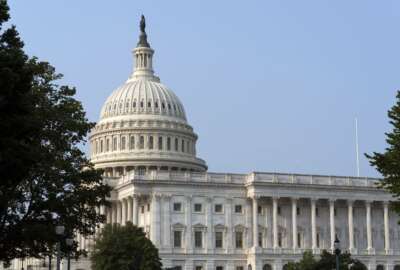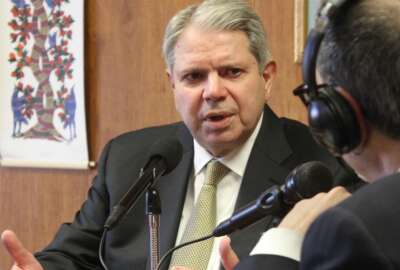
Congress has a decidedly nuts-and-bolts week
Congress last week took up several issues close to the federal bureaucracy. There was the Small Business Administration and its struggles with defaulted COVID...
Congress last week took up several issues close to the federal bureaucracy. There was the Small Business Administration and its struggles with defaulted COVID loans, the Veterans Affairs Department and its troubled Electronic Health Record project, and the [Government Accountability Office (GAO’s) High-Risk List. With what to expect in the week ahead, Federal Drive with Tom Temin spoke with CBS News congressional correspondent Scott MacFarlane.
Interview transcript:
Tom Temin And what’s the week going to look like in Congress? They are both still in session after some time off earlier.
Scott MacFarlane Yeah, it’s going to be one of those weeks where you can count the hearings and meetings by the dozen, not on one hand. There’ll be some hearings that are more messaging hearings for the Republican majority. They’re going to bring in teacher unions and school officials to talk about the school closures during the COVID-19 pandemic. They’re going to talk about the Biden administration spending, some of the budgets that are likely to come through the Appropriations Committee. But more than anything in the U.S. House, there is one singular thing that’s going to drive the week and drive the agenda. Can the House pass this Republican debt ceiling plan, which, in addition to raising the debt ceiling by $1.5 trillion and or through March 2024, would scale back spending to 2022 levels, some of the discretionary spending issues and some of the agencies that are nonmilitary. That’s a controversial proposition, and it’s unclear if they can get 218 Republican votes, notwithstanding the fact that that bill has no future in the U.S. Senate. All of this really is an ominous warning that the debt ceiling limit, the risk of default, is probably just two or three months away. And there seems to be no path ahead.
Tom Temin Right. And one of the things they were talking about, I think, in relation to that proposal, the $1.5 trillion raise in it, was the work for welfare kind of idea. And that would seem to be a federal and a state issue.
Scott MacFarlane Yeah, and not an easy one to navigate. Putting in work requirements requires any number of levels of approval. Politically and administratively, I don’t see a path forward to that becoming law. So it brings us back to the basic question here, where are we in these talks? What’s the possibility of actually having talks to prevent a breach of the debt ceiling and a cataclysmic impact on the U.S. economy? Right now, as this week unfolds, the House Republicans are trying to debate with themselves what they would support in a messaging bill to give them leverage for potential future talks with President Biden. If they can’t even pass this, It’s unclear what the road ahead is in the House, and you have to have the House’s approval to raise the debt ceiling.
Tom Temin And last year, when they were trying to get to a 2023 operating budget for the federal government, there was the so-called Four Corners talks. The House and Senate, Republican and Democratic appropriators. Is there any kind of equivalent to that, those four corners for the debt ceiling talks that maybe some cooler heads can get together and actually come up with something people could live with?
Scott MacFarlane Yeah, I think that’s a logical next step. If this vote fails in the U.S. House or even if it passes, ultimately, it’s going to have to be some bipartisan coalition that form somehow, someway. It’s going to have to be, there’s no other way to do it. And the Four Corners is a pretty appropriate place to do it, having all the appropriators in the same room, because they’re the ones who can help control the spending. Just one unrelated, but I think historic notice, also this year, the Four Corners are all women. For the first time, the top appropriators from both parties in both chambers are all women. And this may end up ultimately being in the Appropriations Committees hands. And you’re going to have to find some patchwork of Democrats and Republicans who can work together, but also get something through together into law.
Tom Temin We’re speaking with Scott McFarlane of the congressional correspondent for CBS. And this all stands in the way of any meaningful committee work on actual appropriations for 2024. The White House proposal is out, that seems to have been forgotten about at this point.
Scott MacFarlane The appropriations bills or the appropriations requests, I should say, are being discussed this week. There’ll be hearings where agency heads will come in and talk about what they need for spending in the year ahead. We also know the Capitol police chief appears before the Senate Appropriations Committee Tuesday to talk about what his budget needs are. And you can expect him to ask for a rather robust increase in spending. They want to hire hundreds more officers and help provide more gear and equipment and more readiness to prevent another crisis. So we’re talking about the appropriations process. To a degree, it’s kind of on schedule. But there’s no sense of how the appropriations process is going to function in a divided Congress, that at this point, can’t even figure out how to raise the debt ceiling.
Tom Temin Plus, there are some specific members that are, I hate to use the word in-play, but we don’t know the future of Dianne Feinstein (D-Calif.), for example. And Senator Fetterman (D-Pa.) from Pennsylvania is not looking like he’s totally in command these days. Does that have any effect on this? Or does it push things further down?
Scott MacFarlane I think every absent vote has an effect when it’s a 51-49 Senate having struggles. Last week included getting the Labor secretary nomination through, because not all the Democrats are present or willing to vocalize their support. Judge confirmations are risk of being stalled. So now let’s put in the more choppier waters of trying to raise the debt ceiling and all the political impacts that come with it. Yeah, that’s a variable, it’s a problem. And I think, to a degree, it’s one of the variables and one of the problems moving forward. We’re getting close to a time where the stock markets are going to start reacting to the uncertainty, that could be imminent.
Tom Temin Right. And there’s another wild card that seems to have gotten thrown in late last week, and that is a resurrection of the Green New Deal. I thought that was all in the infrastructure bill from last year. But they’re bringing that up afresh and a whole parade of Democratic senators in favor of that, which the numbers are kind of hard to fathom, actually what they would spend.
Scott MacFarlane Yeah. And at the same time, you have in this Republican debt ceiling proposal, which gets debated this week, a call to pull back some of the clean energy money as a way of cutting costs. That was a clear message from the Republicans that they believe it’s a winning issue for them to try to scale back green investments. And you’re talking about two different sides in a divided Congress, at times aren’t even speaking the same language. Forget about being on the same wavelength. They’re diametrically opposed on issues that they’re going to have to be in lockstep on before the date of this debt ceiling arise.
Tom Temin And there are a lot of nuts and bolts little bills floating around. I just see a release the other day that one of the Republican members on the Veterans Affairs subcommittees has three bills to improve veterans compensation, Veterans Benefits Improvement Act, Things like that are floating around. Do they have any chance? Again, what I call nuts and bolts changes for the federal bureaucracy, they seem to get lost in the shuffle here.
Scott MacFarlane I think that’s one of the safe havens, even in a politically toxic moment. The Veterans Affairs Committees, House and Senate, the Armed Services Committees, House and Senate, where you do see a coalition of bipartisan groups forming on different issues and legislation to get the support of both parties. I think the nuts and bolts bills, many of these involve veterans that are in funding, veteran medical center, community clinic funds, research benefits. Those are the types of things that can form a coalition, and can see the light of day. Question is, what train do they hitch their car? Will the standalone veterans bill passed both the House and the Senate, this Congress? It’s possible. Or do they put that into something bigger, something that may fly through with other things attached? I think those are the types of things that can still move. It’s just a matter of when and how.
Tom Temin Yeah, that [National Defense Authorization Act (NDAA)] is getting to be like a two-mile freight train in recent years, and it keeps picking up more and more of a last.
Scott MacFarlane Last minute freight train moving real fast.
Tom Temin A few weeks ago they were all in a lather on the hill about TikTok and so on, and that kind of faded away. And then last week we had the whole Dischord disclosure, with respect to those classified documents. Is that still on their radar? Or is that just another kerfuffle? And onto the money.
Scott MacFarlane Let me start with TikTok, because TikTok is going to yield some legislation. The House Energy and Commerce Committee chair is drafting what she characterizes as a targeted, narrow band of TikTok, as Congresswoman Cathy McMorris Rodgers (R-Wash.) expects to have that out sometime in May. Then there is, some, or at least there was some momentum behind bills that rein in TikTok. So they’re still moving forward with the legislation, even though it seems to have collapsed out of the news cycle. And discord that’s whetting the appetite of congressional oversight in a way that is not going to go away tomorrow, is not going to go away next week. Multiple House committees want reviews into not only how secrets made their way onto a gaming platform, how somebody so young with a National Guard outfit in New England could get access to these state secrets. But also, where was the oversight internally in the administration? I think you’re going to see multiple congressional committees still want a piece of that, and that’s not going away anytime soon.
Copyright © 2024 Federal News Network. All rights reserved. This website is not intended for users located within the European Economic Area.
Tom Temin is host of the Federal Drive and has been providing insight on federal technology and management issues for more than 30 years.
Follow @tteminWFED
Related Stories




